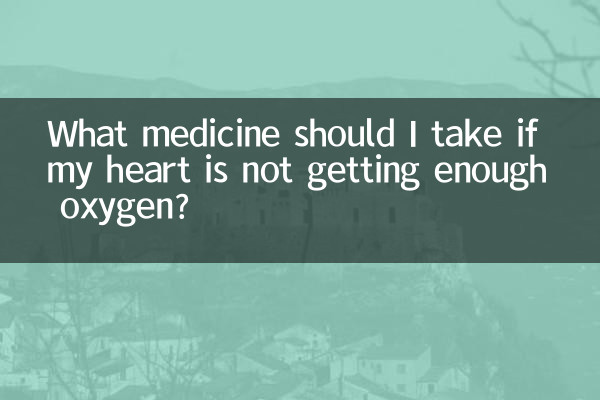What medicine should I take if my heart is not getting enough oxygen?
Insufficient oxygen supply to the heart is a common cardiovascular disease, usually caused by coronary artery stenosis or spasm, which may lead to angina or even myocardial infarction. To address this problem, reasonable drug treatment is key. The following is a compilation of hot topics and hot content about insufficient oxygen supply to the heart in the past 10 days across the Internet, combined with the advice of medical experts to provide you with a detailed medication guide.
1. Common symptoms of insufficient oxygen supply to the heart

The main symptoms of insufficient oxygen supply to the heart include chest tightness, chest pain, shortness of breath, fatigue, etc. In severe cases, it may be accompanied by sweating, nausea or dizziness. The following are statistics on symptoms that netizens have recently paid attention to:
| Symptoms | Attention (percentage) |
|---|---|
| Chest tightness | 45% |
| chest pain | 30% |
| Shortness of breath | 15% |
| Others (fatigue, dizziness, etc.) | 10% |
2. Commonly used drugs for insufficient oxygen supply to the heart
According to medical research and clinical practice, drug treatments for insufficient cardiac oxygen supply mainly include the following categories:
| drug class | Representative medicine | Mechanism of action |
|---|---|---|
| Nitrates | Nitroglycerin, isosorbide mononitrate | Dilate coronary arteries and increase blood supply to myocardium |
| beta blockers | Metoprolol, atenolol | Reduce myocardial oxygen consumption and reduce heart load |
| calcium channel blockers | Nifedipine, amlodipine | Dilate blood vessels and improve blood supply to myocardium |
| antiplatelet drugs | aspirin, clopidogrel | Prevent thrombosis and reduce the risk of myocardial infarction |
3. Recent hot topics: auxiliary treatment for insufficient cardiac oxygen supply
In addition to drug treatment, netizens have also recently paid attention to the following auxiliary treatments:
| Helper methods | Attention | Remarks |
|---|---|---|
| diet modification | high | Low salt and fat, eat more fruits and vegetables |
| Sports rehabilitation | in | Moderate aerobic exercise, such as walking |
| Traditional Chinese Medicine Conditioning | in | Chinese medicinal materials such as Salvia miltiorrhiza and Panax notoginseng |
4. Medication precautions
1.Nitroglycerin: Take sublingually during acute attack. Avoid long-term continuous use to prevent drug resistance.
2.beta blockers: Asthma patients should use with caution and adjust the dosage according to medical advice.
3.calcium channel blockers: May cause edema of lower limbs, side effects need to be monitored.
4.antiplatelet drugs: Pay attention to the risk of bleeding during long-term use.
5. Expert suggestions and summary
Drug treatment for insufficient cardiac oxygen supply needs to be individualized, and patients should use drugs rationally under the guidance of a doctor. At the same time, improving lifestyle (such as quitting smoking, controlling weight) and regular review are crucial. If symptoms worsen or occur frequently, seek medical attention promptly.
The above content combines recent discussion hot spots in medical forums, health self-media and patient communication groups, hoping to provide scientific reference for patients with insufficient cardiac oxygen supply.

check the details

check the details